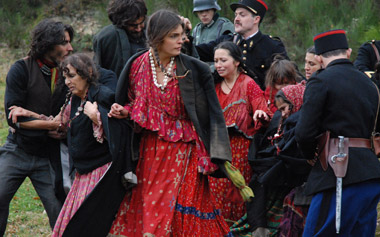The great Gypsy guitarist Django Reinhardt pulled off one of music’s neatest tricks during his short time with us. He was most active in a time (the 1920s to 1940s) and place (Paris) that saw the production of some truly outstanding music, and his recorded output has managed to overshadow that of nearly all his contemporaries, essentially defining the sound of pre-war France in the minds of most of the world.
Django’s music was born in the cafes and bals musettes where immigrant communities gathered to dance and drink, but Reinhardt always dreamed big. A lover of American movies—he would often take his young son to see cowboy and gangster pictures, which the boy would peg as American based on the music alone—he approached his first U.S. tour with daydreams of a Hollywood contract. It was a dream dreamed in vain.
Or so it seemed.
Today, Reinhardt’s music is some of the most recognized film music going, wildly popular in a range of genres. Frequently used in the films of Woody Allen (whose Sweet & Lowdown was also inspired by the guitarist), the master’s music also appears in period films, science fiction hits like The Matrix, and even the popular video game series BioShock. Django, it seems, finally got his wish.
This week, hundreds of musicians descend on the Valley to pay tribute to the man and his music for Django in June, a weeklong series of concerts, workshops, and, yes, film. To kick off this year’s event, Amherst Cinema will play host to an evening of live music and film centering on a screening of Tony Gatlif’s film Liberte at 7:30 p.m. this Wednesday, June 15.
For many Valley filmgoers, Gatlif is an old favorite; he scored an art house hit with his 1993 film Latcho Drom, about the life and music of nomadic Romany tribes. His latest is a study of Gypsy persecution in France during the Holocaust years. In it, a small town mayor, a schoolteacher, and a young war orphan find themselves building relationships with a newly arrived band of Gypsies looking for work in the area. Trapped when the changing laws of occupied France make their roaming lifestyle illegal, the group of wanderers—and their new acquaintances—are forced to reconsider the true meaning of freedom and of imprisonment.
Along with Gatlif’s film, admission for the event entitles you to hear one of the young stars in Reinhardt’s ongoing musical tradition. Jason Anick—a hot young fiddler who plays all over the world with some of the genre’s best musicians—will be on hand to treat audiences to a taste of what makes it all so enchanting.
*
Also at Amherst this week: Louder Than a Bomb is a documentary look at the Chicago area phenomenon that lends the film its title: the world’s largest youth poetry slam, a decade-old contest that now draws over 600 teenagers from area schools. In an unusual twist, this slam focuses not on the individual, but on teams of poets; the film follows four of the teams as they prepare for the 2008 event. The resulting collaborative efforts demand that the teens create a sense of support and trust in a peer-led environment—a first for many of the entrants, and a situation that has dramatic consequences both joyful and heartbreaking.
Finally this week is Meek’s Cutoff, the new film from director Kelly Reichardt (Wendy and Lucy). This period piece, set in 1845 on the Oregon Trail, reunites the filmmaker with actress Michelle Williams. She stars as Emily Tetherow, a young mother in a group of pioneers who become stranded due to their trail guide’s ineptitude. When they stumble across the path of a Native American, the travelers must decide if he is truly the enemy they have come to believe, or if he represents their only hope of survival.
Jack Brown can be reached at cinemadope@gmail.com.



